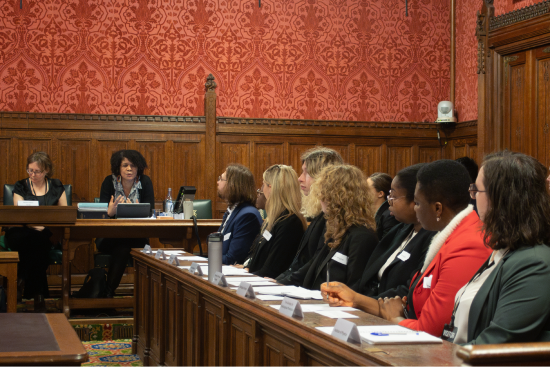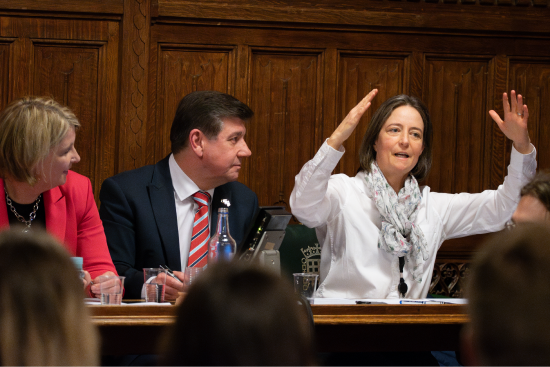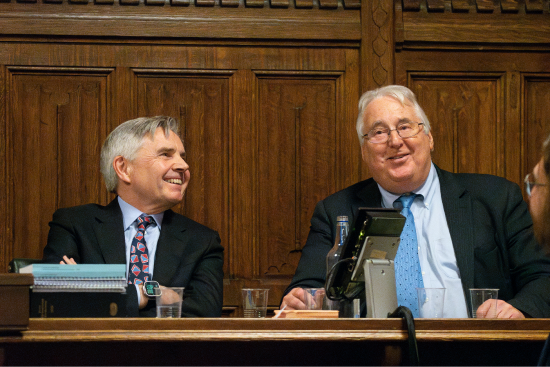News
Parliamentarians questioned by scientists in Voice of the Future 2024 over key issues: AI, food security, and STEM job pipelines
- Details
- 14 March 2024
Voice of the Future is organised by the Royal Society of Biology on behalf of a number of learned societies, including the Anatomical Society, Applied Microbiology International, the Association of Applied Biologists, the Biochemical Society, the British Ecological Society, the British Pharmacological Society, the British Society for Immunology, the Council for Mathematical Science, the Genetics Society, the Geological Society, the Institute of Physics, the Nutrition Society, the Royal Society of Chemistry, the Society for Chemical Industry, the Society of Experimental Biology, and the Society for Radiological Protection.
The event allows early career scientists to question parliamentarians in a role-reversal of a normal select committee inquiry. This year’s event was held on Tuesday 12 March 2024 in Committee Room 11, House of Commons.

The first session saw Chi Onwurah MP, Shadow Minister for Science, Research & Innovation take to the stand.
Questions from the Association of Applied Biologists and the British Society for Immunology focused on how to attract and retain international talent, and queried how the UK aims to work collaboratively with other nations, particularly in light of the climate crisis and improving global agricultural productivity and sustainability. The Shadow Minister highlighted that we are belatedly recognising and acknowledging the importance of agriculture and nature-based solutions, but that there is great strength in the UK’s agricultural research units, such as Kew. She stressed the need to work with European and international partners, particularly in light of how damaging leaving Horizon Europe was to the UK, wanting British researchers – who have so much to offer – to be integral to this. Innovation only happens when people from different backgrounds and disciplines come together. For this, a long-term approach to funding is necessary to make the UK an even more attractive destination for people to come and work.
In response to the Society for Radiological Protection’s query regarding how the UK plans to address the STEM skills gap, the Shadow Minister acknowledged that the UK’s potential is being held back by these shortages, and that given STEM subjects are increasingly part of our lives, there will be more demand for them in the future. Skills 4 England is a new body which will support this through apprenticeships and supporting colleges, identifying areas with a lack of skills, and working to develop this. She also said that we must work with other nations to address the challenges we face across the world.

Katherine Fletcher MP, Stephen Metcalfe MP, and Carol Monaghan MP, members of the House of Commons Science, Innovation & Technology Select Committee led the second session.
A question raised by the Anatomical Society honed in on what role UK Parliament and Government would play in ensuring scientific research is communicated clearly to the general public so speculation and misinformation can be avoided. Answering this, Stephen Metcalfe raised the point that the Government has a critical role to play in encouraging the public to not believe everything it sees and hears. The world is changing at such a pace that we are now in a time of dealing with high-quality fake information which looks highly credible and convincing. Science can often be seen as inaccessible and difficult to understand, and so scientists have a role to play in how they communicate their research to policymakers. Stephen Metcalfe added that he’d like to “make science one of the topics that’s discussed in the pub, alongside football.”
Carol Monaghan fielded the question from the Society for Radiological Protection surrounding how UK policies can support increased use of AI within medical services to ensure patient and public safety. She specified that there has to be public confidence in understanding who owns and has access to that data, which hasn’t been thrashed out in terms of legislation yet.
Stephen Metcalfe stated that the public needs to be given reassurances that the AI has been trained properly and with the appropriate data. Katherine Fletcher highlighted the three key areas of focus: data security, anonymisation, and confidence in data sets, with the much-needed overhaul that the NHS’ antiquated IT systems will undergo in light of this year’s Spring Budget allocation of £3.4bn specifically for this.
The British Ecological Society’s question pertaining to nature versus farming conflicts and the Government’s role regarding nature recovery policy was answered by Katherine Fletcher. She said that food security is important and it is about not being tone-deaf to the questions and concerns people raise. Katherine Fletcher mentioned that they have been involved in the Committee’s report on insects lately, where interesting discoveries about farming that allow for reduced pesticides and herbicides have come to light, whereby farming practices create a vibrant invertebrate ecosystem, and how those interact with Government schemes.

The third and final session was led by the Viscount Stansgate and Lord Drayson, members of the House of Lords Science & Technology Select Committee.
A question from the Biochemical Society focused on what approach UK Parliament and Government would take to communicate scientific research more clearly to the general public with a view to avoid speculation and misinformation. The Viscount Stansgate acknowledged the huge impact of social media on society, the challenges to freedom of speech, and highlighted that this is a challenging area of science policy. He said that the public is capable of grasping concepts, and that government should take the lead on explaining issues to the public, and not only leaving it up to individual companies to explain matters.
Questions from the British Society for Immunology and the Genetics Society concentrated on what Government’s approach to enhancing public trust in science and medicine would look like, and how medically sensitive information kept by private companies should be regulated.
Lord Drayson stressed that Government should make every effort to increase public understanding of scientific methods and how that is applied to new medicines. Historically, the public has been presented scientific discussion in an ineffective way; two scientists with opposing arguments would be pitted against each other in a debate, whereas a consensus within the scientific community needs to be presented to the public, alongside tools to enable the public to make judgements based on good statistical analysis.
To the point of regulating sensitive data collection and storage, the Viscount Stansgate emphasised the importance of this data toward disease mapping, however he stressed that there needs to be trust in how the data is being used and stored in order to make progress.
The British Pharmacological Society questioned the issue of how the UK’s science education curriculum can best be reformed to better prepare students and researchers for the challenges of the 21st century (public health, the climate crisis, and technological advancements). The Viscount Stansgate stated that we specialise too early in science in British education systems. Lord Drayson added to this by saying that the speed and level of change currently is much greater than it was 30-40 years ago, and that our education systems should reflect what is happening in scientific research around us. There needs to be a revaluation of applied skills needed that only humans can do, and must be empowered to do so.
Many thanks to the staff of the House of Commons Science, Innovation & Technology Select Committee for their support in making the event possible, to the MPs and Peers for generously giving us their time, and to all those who took part.

